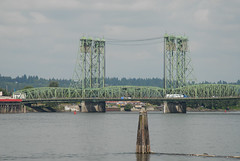A coalition of five local non-profit groups are calling for “an immediate restart of the deadlocked I-5 planning process.”
The Coalition for a Livable Future, the Bicycle Transportation Alliance, Environment Oregon, Environment Washington, and Upstream Public Health just issued a joint news release saying they want a new plan for the Columbia River Crossing.
Here’s the word from the release:
“Seeing no regional agreement on the size, funding, congestion management, or design of the project, the five groups are calling for a restart of the deadlocked planning process. The groups are promoting a new approach – a “CRC 2.0” – that starts with region’s shared values of economic vitality, affordable transportation, safe and healthy neighborhoods, and reductions in greenhouse gas emissions.”
So far, planning for the CRC project — which has lost serious momentum in recent months as many politicians have questioned its viability — has already cost taxpayers in the region $80 million dollars (and has another $50 million committed to it).
Besides the fact that many key components of the project’s construction have still not been agreed upon, the new coalition points to the election of Tim Leavitt in Vancouver has yet another sign that the current project is doomed. Leavitt has been outspoken against tolls on a new I-5 bridge, and tolls are seen as an imperative part of the project.
This coalition calls for a new plan that would use “least cost planning principles and include land use changes, transportation investments, and management strategies”. The major difference they’d like to see in a new plan is that the design of the project happen “outside of the Departments of Transportation”.
In a statement BTA Executive Director Scott Bricker said,
“Rather than pick apart the $4 billion, unpopular version, we should start with our shared goals and see what could be done to meet them. In this economy, we should be maintaining and optimizing the roads we already have, not building bigger and more expensive ones that degrade our communities.”


